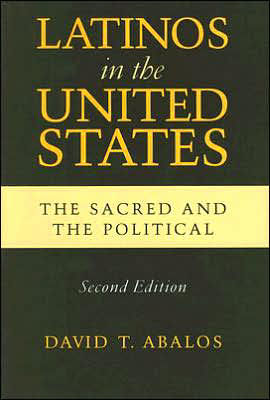
|
January 18, 2008
Book: Latinos in the United States: The Sacred and the Political Author: David T. Abalos Notre Dame Press. Notre Dame, IN. 2007. Pp. 327 An Excerpt from the Foreword:
Why a theory and therefore also a practice of transformation? The idea of theory first came into being in Greece to describe the compassionate act of meditating upon the dying and rebirth of a god, and therefore of all human beings for whom this god constituted their force of life. Each year Greek cities sent a representative to an enactment of this drama of dying and being reborn. Each representative upon his return had to report in public on his experience of this transformation. Theory first arose, and always arises, out of the same beginning as transformation. Both begin with a great dying — with the death of what was once held to be sacred, empowering, and secure. Both renew our questioning and our compassion. Both demand our participation, personally and politically, in a drama of rebirth. Theory constitutes our shared understanding of how the cosmos of human relationships can be nourished, destroyed, and re-created with love and justice. But such a shared theory of practice is transforming only if it liberates each individual to make his and her own creative contribution, which is always – as a proof of freedom – unique in its actual, concrete practice, even while it expresses underlying patterns that [theory shows] we share by virtue of our species-being. The theory of transformation which David Abalos here pioneers in applying it to Latino communities in the United States is both a critical and a creative theory. It is connected with our participation in changing both underlying forces and their concrete manifestations in human relationships when they have become unbearable or fruitless as well as in nourishing them knowledgeably and lovingly as we help to make them just. An Excerpt from the book: At the same time that we are witnessing the amazing growth of the Latino community there are urgent civil rights issues that require our immediate response. The most serious civil rights issue that touches all aspects of the community is that of education. We know that nationwide the failure of Latino children to finish high school hovers around 30 percent. This lack of educational achievement is taking place at a time when the U.S. has gone from experiencing the greatest rate of sustained economic growth in our history to an economy nervous about reliable oil supplies, scandals in the business community, and the uncertainties brought about by possible recession, war and terrorism. The $1.3 trillion tax cut voted in 2001 and the $356 billion tax cut passed in 2003 as requested by Mr. Bush favor the upper 5 percent of American citizens. There was no money in the budget for 2004 to assist the states that were facing a collective shorfall of $45 billion and a projected gap of $60 to $85 billion for next year. This fiscal crisis is hitting the poor the hardest. Two-thirds of the states are cutting Medicaid benefits, increasing co-payments, restricting eligibility, and even removing poor people from the rolls due to soaring costs and low revenues. For the first time since the government began to measure poverty the country experienced four consecutive years (2000-2004) of an increase in the rate of poverty. The poor grew from 31.6 million to 37 million. In 2004 the poverty rate for Latinos stood at 21.9 percent in contrast to whites at 8.6 percent. These facts highlight the underlying inability of capitalism to respond with justice and compassion to the needs of our citizens and, in this case, the needs ofthe Latino community. The hi-tech aspect of our economy continues to eclipse the manufacturing sector and opens up more jobs in the service sector that usually bring lower wages, no benefits such as health care, and little or no job security. This means that education, especially higher education, is the highest priority for la comunidad Latina in the U.S. It is not just any kind of education that I am speaking of here, but rather that kind of education that not only provides us with skills, but also raises fundamental questions about who we are as a community and where we are going as a society. Table of Contents: 1. A theory of transformation 2. The search for Latina/Latino identity 3. The politics of the Latino family 4. The politics of transformation in the Latino community 5. Latinas/Latinos and the sacred 6. The politics of liberation versus the politics of assimilation 7. Latina/Latino professionals: a transforming middle class 8. Choices for La Comunidad Latina: creating the present and the future now 9. The politics of education: the most important civil rights issue facing La Comunidad Latina |
|
